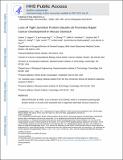| dc.contributor.author | Hagen, Susan J. | |
| dc.contributor.author | Ang, Lay-Hong | |
| dc.contributor.author | Zheng, Yi | |
| dc.contributor.author | Karahan, Salih N. | |
| dc.contributor.author | Wu, Jessica | |
| dc.contributor.author | Wang, Yaoyu E. | |
| dc.contributor.author | Caron, Tyler | |
| dc.contributor.author | Gad, Aniket P. | |
| dc.contributor.author | Muthupalani, Sureshkumar | |
| dc.contributor.author | Fox, James G | |
| dc.date.accessioned | 2020-07-21T19:06:45Z | |
| dc.date.available | 2020-07-21T19:06:45Z | |
| dc.date.issued | 2018-09 | |
| dc.date.submitted | 2017-01 | |
| dc.identifier.issn | 0016-5085 | |
| dc.identifier.uri | https://hdl.handle.net/1721.1/126290 | |
| dc.description.abstract | Background & Aims: Loss of claudin 18 (CLDN18), a membrane-spanning tight junction protein, occurs during early stages of development of gastric cancer and associates with shorter survival times of patients. We investigated whether loss of CLDN18 occurs in mice that develop intraepithelial neoplasia with invasive glands due to infection with Helicobacter pylori, and whether loss is sufficient to promote the development of similar lesions in mice with or without H pylori infection. Methods: We performed immunohistochemical analyses in levels of CLDN18 in archived tissues from B6:129 mice infected with H pylori for 6 to 15 months. We analyzed gastric tissues from B6:129S5-Cldn18tm1Lex/Mmucd mice, in which the CLDN18 gene was disrupted in gastric tissues (CLDN18-knockout mice), or from control mice with a full-length CLDN18 gene (CLDN18+/+; B6:129S5/SvEvBrd) or heterozygous disruption of CLDN18 (CLDN18+/−; B6:129S5/SvEvBrd) that were infected with H pylori SS1 or PMSS1 at 6 weeks of age and tissues collected for analysis at 20 and 30 weeks after infection. Tissues from CLDN18-knockout mice and control mice with full-length CLDN18 gene expression were also analyzed without infection at 7 weeks and 2 years after birth. Tissues from control and CLDN18-knockout mice were analyzed by electron microscopy, stained by conventional methods and analyzed for histopathology, prepared by laser capture microdissection and analyzed by RNAseq, and immunostained for lineage markers, proliferation markers, and stem cell markers and analyzed by super-resolution or conventional confocal microscopy. Results: CLDN18 had a basolateral rather than apical tight junction localization in gastric epithelial cells. B6:129 mice infected with H pylori, which developed intraepithelial neoplasia with invasive glands, had increasing levels of CLDN18 loss over time compared with uninfected mice. In B6:129 mice infected with H pylori compared with uninfected mice, CLDN18 was first lost from most gastric glands followed by disrupted and reduced expression in the gastric neck and in surface cells. Gastric tissues from CLDN18-knockout mice had low levels of inflammation but increased cell proliferation, expressed markers of intestinalized proliferative spasmolytic polypeptide-expressing metaplasia, and had defects in signal transduction pathways including p53 and STAT signaling by 7 weeks after birth compared with full-length CLDN18 gene control mice. By 20 to 30 weeks after birth, gastric tissues from uninfected CLDN18-knockout mice developed intraepithelial neoplasia that invaded the submucosa; by 2 years, gastric tissues contained large and focally dysplastic polypoid tumors with invasive glands that invaded the serosa. Conclusions: H pylori infection of B6:129 mice reduced the expression of CLDN18 early in gastric cancer progression, similar to previous observations from human gastric tissues. CLDN18 regulates cell lineage differentiation and cellular signaling in mouse stomach; CLDN18-knockout mice develop intraepithelial neoplasia and then large and focally dysplastic polypoid tumors in the absence of H pylori infection. | en_US |
| dc.description.sponsorship | National Institutes of Health (Grants R01-CA093405, P30-ES002109, R01-OD011141, P01-CA028842 and T32-OD0109978) | en_US |
| dc.language.iso | en | |
| dc.publisher | Elsevier BV | en_US |
| dc.relation.isversionof | http://dx.doi.org/10.1053/j.gastro.2018.08.041 | en_US |
| dc.rights | Creative Commons Attribution-NonCommercial-NoDerivs License | en_US |
| dc.rights.uri | http://creativecommons.org/licenses/by-nc-nd/4.0/ | en_US |
| dc.source | PMC | en_US |
| dc.title | Loss of Tight Junction Protein Claudin 18 Promotes Progressive Neoplasia Development in Mouse Stomach | en_US |
| dc.type | Article | en_US |
| dc.identifier.citation | Hagan, Susan J. et al. "Loss of Tight Junction Protein Claudin 18 Promotes Progressive Neoplasia Development in Mouse Stomach." Gastroenterology 155, 6 (December 2018): P1852-1867 © 2018 AGA Institute | en_US |
| dc.contributor.department | Massachusetts Institute of Technology. Division of Comparative Medicine | en_US |
| dc.contributor.department | Massachusetts Institute of Technology. Department of Biological Engineering | en_US |
| dc.relation.journal | Gastroenterology | en_US |
| dc.eprint.version | Author's final manuscript | en_US |
| dc.type.uri | http://purl.org/eprint/type/JournalArticle | en_US |
| eprint.status | http://purl.org/eprint/status/PeerReviewed | en_US |
| dc.date.updated | 2020-03-06T13:53:22Z | |
| dspace.date.submission | 2020-03-06T13:53:24Z | |
| mit.journal.volume | 155 | en_US |
| mit.journal.issue | 6 | en_US |
| mit.license | PUBLISHER_CC | |
| mit.metadata.status | Complete | |
